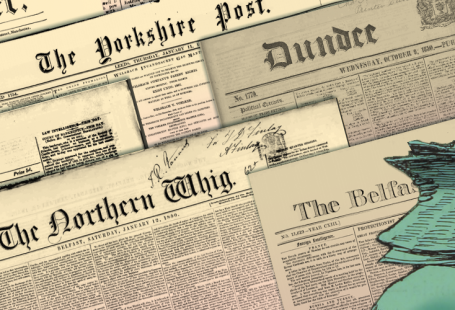In spite of the hot weather here at The Archive we are delighted to bring you 209,493 brand new pages from across the world, with new pages joining publications from the likes of England, Ireland, Scotland, Wales, Canada and Barbados. We have extensive and exciting updates to some of our wonderful regional titles, which span the years 1742 to 1997, as well as to one of our special illustrated titles, Black & White.
So read on to discover more about our updated titles of the week, as well as to discover, as the United Kingdom continues to bask in a heatwave, more about the heatwave and drought of 1911, which saw the recording of the highest accepted temperature at the time, 36.7 °C, which was only surpassed in 1990.
Register now and explore the Archive
By far and away our largest update of the week is the over 60,000 pages we have added to the Kentish Express, which covers the years 1855 to 1972. The Kentish Express was first published on 17 July 1855 as the Ashford and Alfred News and General Advertiser, at the cost of just one penny. Published in the town of Ashford, which at the time of this newspaper’s publication was seeing growth due to the arrival of the railway, the Kentish Express filled eight pages and initially appeared every Tuesday.

The first edition of the newspaper declared the need in the local neighbourhood for a ‘paper containing the latest, fullest, and best intelligence, published at the lowest possible price.’ Following the abolition of the newspaper stamp duty, this was now something that the Kentish Express could provide, alongside features appealing to the ‘The Politician’ and the ‘Lover Of News.’ For the latter figure, the Kentish Express would provide a ‘plentiful selection of Foreign and Domestic occurrences, cases of interest in our Metropolitan Law and Police Courts, as well as matters nearer home, so as to combine, as far as possible, a London and Local Paper in one.’
In 1858 the newspaper went through several name changes before finally settling on the Kentish Express. Neutral in its politics, the publication switched to a Saturday publication schedule and by the 1880s it was circulating in ‘East, West, and Mid-Kent, the Weald of Kent, and East Sussex.’ It was remarked upon at the time how the newspaper had ‘no political feature,’ but it provided ‘the local and county news fully,’ as well as a ‘digest of general news, London and country markets.’ By the 1880s it had a guaranteed circulation of just over 30,000.

This historic newspaper, which was Kent’s first penny paper following the abolition of stamp duty, continues to be published to this day, with four separate local editions.
Another update of note are the nearly 30,000 new pages that we have added to the Nottingham Evening Post, which was founded in 1878 by Thomas Forman. Nottingham’s first ever evening paper, the new newspaper cost one halfpenny and filled four pages. Neutral in its politics, it circulated in ‘the principal towns and villages of Nottinghamshire, Derbyshire, Leicestershire, and Lincolnshire.’ This historic newspaper continues to be published to this day in tabloid form as the Nottingham Post.

This week also sees significant updates to our Birmingham holdings. We’ve added new pages to the Birmingham Mail, as well as to the Birmingham Weekly Mercury, and finally to the historic Aris’s Birmingham Gazette, which was one of the foremost provincial newspapers in the eighteenth century.
Across the border and into Scotland we’ve added over 7,000 brand new pages to the Edinburgh Evening News. This independent daily newspaper was established in 1873 and cost just one halfpenny, circulating ‘in Edinburgh, Leith, and in the East and South of Scotland generally.’ The Edinburgh Evening News continues to be published to this day.

We’ve not neglected our Welsh holdings this week either, with updates to the Glamorgan Gazette, North Wales Weekly News, the South Wales Daily Post and the South Wales Echo. Across the Irish Sea, we’ve added new pages to the Munster Tribune and the East Galway Democrat.
Finally, we’ve added more pages to one of our Canadian titles, the Ottawa Free Press, whilst we’ve also added over 13,000 new pages to the Barbados Agricultural Reporter, which was first published in the Barbadian capital of Bridgetown on 15 January 1845.
‘The Hot Weather Is Responsible for Many Things’ – The 1911 Heatwave
Following on from last week’s look at the hot weather of 1899, in 1911 the United Kingdom was once again struck by a long spell of hot temperatures, beginning on 17 July and lasting all the way to 11 September 1911. During this time the hottest ever temperature of 36.7 °C was recorded in Britain, a high that would not be surpassed until 1990.
The heatwave of 1911 caused widespread unrest across the country. Working patterns were changed, with factory workers starting their day earlier to avoid the heat, with the heat even causing some workers, like dock workers, to strike. Meanwhile, in the days before widespread refrigeration, communities struggled to keep their food fresh.
A look through the new pages of the Kentish Express reveal the widespread impact of the heat upon the United Kingdom, with some positive impacts recorded alongside the negative.

An article on 5 August 1911 revealed the impact on local agriculture, and most especially on the ‘fat stock’ trade, that is, the trade of livestock which was ‘fat and ready for market.’ The newspaper reported how:
The hot weather is all against the fat stock trade and it consequently moves along in a listless sort of style. In London values all round are weak and the country trade is lacking tone. A very short supply of mutton at Ashford on Tuesday owing to the closing of a very large part of the area which supplies the market caused values to be rather better, but the improvement was not to any very appreciable extent.
Meanwhile the Kentish Express on 29 July 1911 took a look at the impact of the heatwave upon arable crops, with the ‘root crops’ noted to be ‘suffering.’ However, the harvest saw a positive impact from the weather, the newspaper reporting how:
On the other hand, the conditions for harvesting, which is now getting into full swing, have been splendid, and unless the weather quite breaks up now the light crop should be of a first rate quality. Thousands of acres of oats and peas have been cut, and with the beginning of the week a start was made upon the wheat.

However the gardeners of Headcorn, a village between Ashford and Maidstone, saw their annual show disrupted by the weather, the Kentish Express detailing how:
The Headcorn Gardeners’ Society held their twenty-seventh annual show on August Bank Holiday, and, like all other shows, were sufferers from the intense and long spell of hot weather, which in some classes considerably affected the numbers.
Furthermore, the newspaper provided advice on how to dress for the hot weather. For example, the Kentish Express advertised ‘Cool Garb for Hot Weather’ on its front page in June 1911, a month before the heatwave began. G & H Hunter, based in Ashford, advertised a range of goods, from ‘flannel suits and trousers’ to ‘summer suitings,’ so its customers would be dressed for the hot temperatures.
Meanwhile the newspaper on 8 July 1911 related how:
The weather has been somewhat unkind throughout June, and coats and skirts have been very much more worn than cotton dresses. However, let us hope that July and August will bring a return of the delightful temperatures we enjoyed in May. The dainty cotton frocks are so numerous that it only requires some hot weather for the feminine portion of the population to exploit them.

The writer was to have their wished fulfilled, and no doubt many women wore those ‘dainty cotton frocks’ throughout the summer of 1911.
Finally, on 9 September 1911 the Kentish Express noted how ‘The hot weather is responsible for many things.’ The article detailed how:
A farmer summoned at Dymchurch for allowing sheep to stray pleaded that it was difficult to keep them in fields owning to the ditches having dried up, while a magistrate who was fined at Hurst Green for a similar offence, stated that the intense heat made the animals restive.
The Kentish Express quipped:
Evidently while heat has the effect of making human beings lethargic it stimulates sheep to ‘skip like young lambs.’

Whilst we at The Archive would very much relish being able to ‘skip like young lambs,’ we fear the hot weather has forced us into the ‘lethargic’ category.
Updated Titles
This week we have updated 33 of our existing titles.
You can learn more about each of the titles we add to every week by clicking on their names. On each paper’s title page, you can read a FREE sample issue, learn more about our current holdings, and our plans for digitisation.
You can keep up to date with all the latest additions by visiting the recently added page. You can even look ahead to see what we’re going to add tomorrow.






